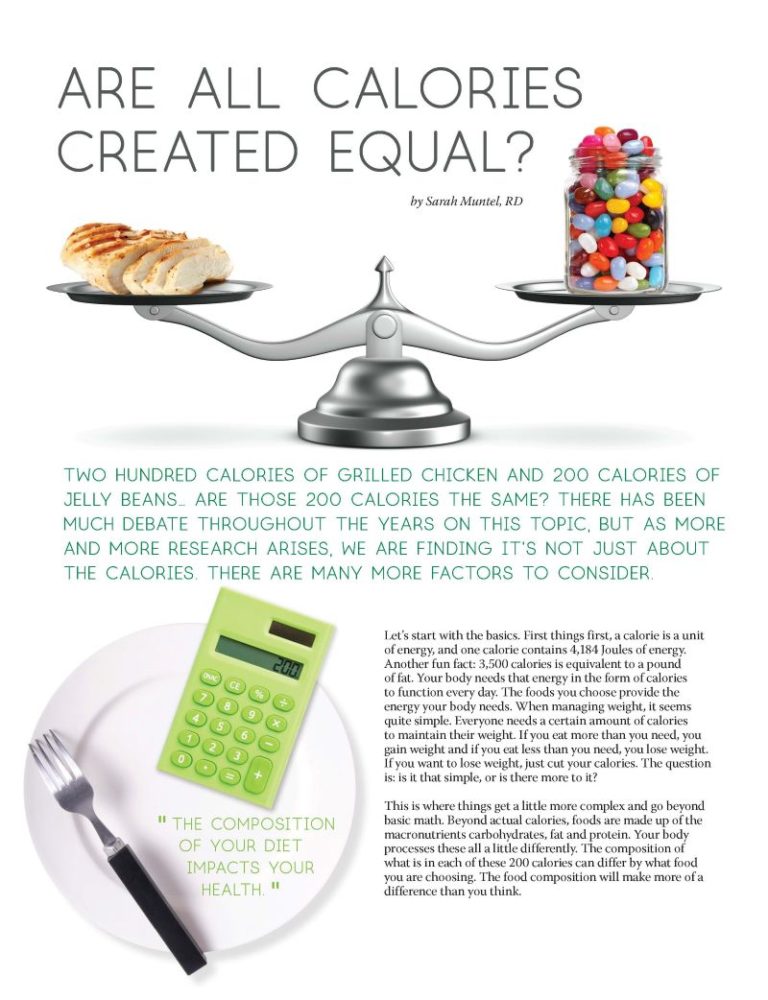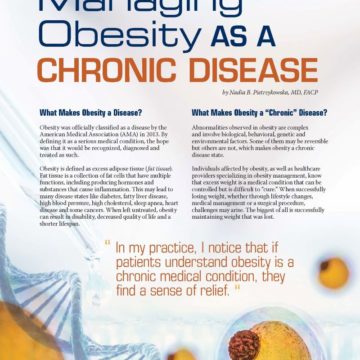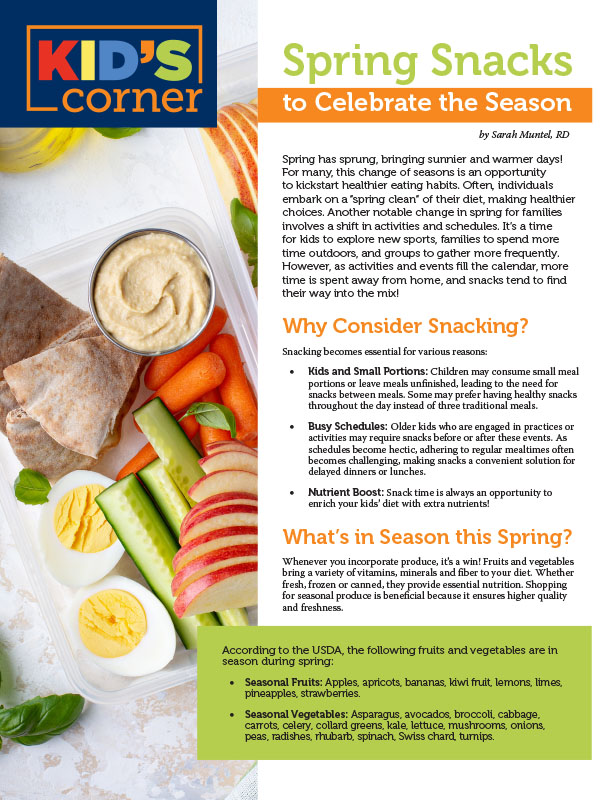Are All Calories Created Equal?


by Sarah Muntel, RD
Spring 2018
Two hundred calories of grilled chicken and 200 calories of jelly beans… are those 200 calories the same? There has been much debate throughout the years on this topic, but as more and more research arises, we are finding it’s not just about the calories. There are many more factors to consider.
Let’s start with the basics. First things first, a calorie is a unit of energy, and one calorie contains 4,184 Joules of energy. Another fun fact: 3,500 calories is equivalent to a pound of fat. Your body needs that energy in the form of calories to function every day. The foods you choose provide the energy your body needs. When managing weight, it seems quite simple. Everyone needs a certain amount of calories to maintain their weight. If you eat more than you need, you gain weight and if you eat less than you need, you lose weight. If you want to lose weight, just cut your calories. The question is: is it that simple, or is there more to it?
This is where things get a little more complex and go beyond basic math. Beyond actual calories, foods are made up of the macronutrients carbohydrates, fat and protein. Your body processes these all a little differently. The composition of what is in each of these 200 calories can differ by what food you are choosing. The food composition will make more of a difference than you think.
So, when you are looking for your next latest and greatest plan, think about the few things below as you choose foods and build your healthy plate:
Calorie Breakdown
Let’s go back to those 200 calories of chicken and jelly beans. It sure doesn’t take a rocket scientist to determine these foods are different. The chicken has 22 grams of protein, two grams of fat and one gram of carbohydrate. Those jelly beans have 25 grams of carbohydrates and almost 20 grams of sugar. That paints a very different picture of what’s on your plate.
The macronutrients (carbohydrates, fat and protein) in the foods you eat can make quite an impact on your body. Carbohydrates are your body’s preferred source of energy. Complex carbohydrates are a good source of fiber. Protein is important for building and repairing muscles and tissues. Fat helps your body to absorb nutrients and produce hormones. All of these are important to your body, and they all impact your body differently.
Your Body Processes Foods Differently
The Thermic Effect of Food (TEF) is the extra energy your body needs to break down and absorb components of food. Carbohydrates and fat are broken down easier than protein. This means your body must work harder when protein-based foods are chosen. The TEF for protein is 20-35 percent vs. carbohydrate and fat, which is 3 to 15 percent.
Satiety Matters
Some foods will make you feel more satisfied than others, which can be a big issue when managing your weight. We already determined your body has to work harder to process protein vs. carbohydrate and fat. Choosing foods higher in protein can make you feel satisfied for a longer period of time. Think of your latest snack break. If you choose processed carbohydrates for a snack such as crackers, chips and cookies, they will not provide the same effect as cottage cheese, deli meat or cheese for the same amount of calories. Your body breaks carbohydrates down more quickly, which will lead to hunger earlier.
Whole foods
Carbohydrates, protein and fat aside, choosing whole food calories also provides satiety. Choosing 100 calories of a fresh apple may provide more satiety than 100 calories of apple sauce. Why is that? They are both fruit. The fresh apple has increased fiber to help with long-term satiety. The applesauce is lacking in that area. Additionally, 150 calories of a sugar-filled soda will not have the same level of satiety as 150 calories of a handful of nuts which provides protein, good fat and fiber.
Metabolic Results May Differ
The composition of your diet impacts your health. As low-carbohydrate diets have become more popular, we see other benefits aside from weight-loss. Metabolic effects are the game changer. Low-carb diets tend to show improvements in Hemoglobin A1C (reducing the need for diabetic medications) and increased body fat-loss.
Weight Management
Short-term studies show that when you choose a higher protein diet, short-term weight-loss is higher than for those who choose a high-carbohydrate diet. This is when calories are consistent. Although long-term data is not as conclusive, there is more to be learned about the best plan to follow long-term. Low-carb dieters report decreased hunger and decreased cravings when following the low-carbohydrate plan.
Note that plans do differ between individuals, so find a plan that works for you. There is no “magic diet” for weight-loss. The best plan is the one you can follow long-term.
Maintain Lean Body Mass
Long-term maintenance of muscle mass is important. It ensures your body is getting the protein it needs to maintain your current muscle mass. If you do not take in the protein your body needs, your body will break down your muscle mass to get the protein it needs. Choosing 1,500 calories without adequate protein could lead to this if the food choices aren’t monitored.
Health Conditions
Certain health conditions rely on the composition of the food, not the calories. For example, diabetes, heart disease and kidney disease all require specific macronutrient amounts – not just calories. Patients with heart disease must follow a low-fat diet, patients with diabetes must follow a lower carbohydrate diet, and patients with kidney disease may be following a low-protein diet. All of these disease states would worsen if only calories were counted.
Conclusion
In the end, what’s really important? A nutrition plan that works for you which you can follow long-term. Not every plan works for every person. If you need extra help, connect to a dietitian or healthcare provider to make adjustments for long-term success. Here’s to a healthy you!
About the Author:
Sarah Muntel, RD is a Registered Dietitian from Indianapolis, IN. She has worked in the field of bariatrics for the past 18 years. She has worked with both bariatric and metabolic surgery patients and medical weight-loss patients. Throughout her career, she has worked in several bariatric centers in Indianapolis. She is currently the Bariatric Coordinator with Community Health Network. Sarah is an active member of the Obesity Action Coalition, serves on the OAC Education Committee and frequently contributes to the Your Weight Matters Magazine and Blog. She also plays an active role in the Indiana State Chapter of the American Society for Metabolic and Bariatric Surgery (ASMBS). In her free time, Sarah enjoys spending time with her husband and watching her three kids play sports.
by Sarah Muntel, RD Spring 2024 Spring has sprung, bringing sunnier and warmer days! For many, this…
Read Articleby Kendall Griffey, OAC Communications Manager Spring 2024 We have officially kicked off Your Weight Matters Regional…
Read ArticleTelemedicine became a popular tool during the pandemic because it allows healthcare professionals to provide medical care…
View Video










